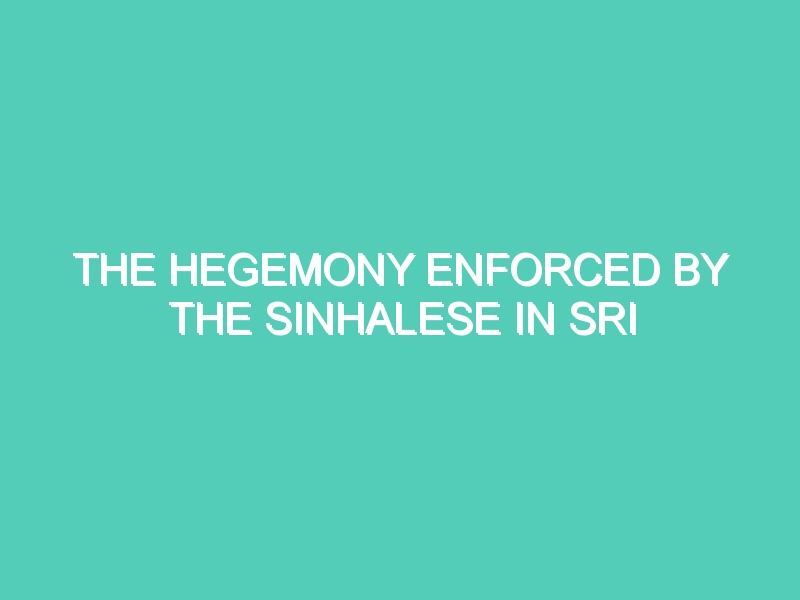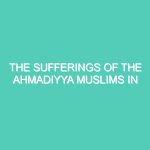Sri Lanka, a nation of many islands is also a nation of many religions. It constitutes as Theravada Buddhism to be the biggest religious group, covering about 70.2% of the population[1]. It is the religion of Sinhalese which has acquired the majority in the country and has the most influential role in any decision ranging from policies to legislations. They form a core part of the nation where because of its history, they have achieved such supremacy and dominant position. The minority constitute of Hindus accounting as 12.6%, Muslims being 9.7% and also Christians who roughly account as 1.5 million of the population[2]. This article aims to delve into the history of the religious persecution of such majority over the minorities and aims to bring out the dominance and neglect of such Sinhalese majority over the recognition and the lack of provisions being made to various religious minorities eventually leading them to a state of despair and destitution.
HISTORY OF THE PERSECUTION
Such religious persecution started way back in Sri Lanka via the events which led to the historic Civil War in 2009 between the Sinhalese and the Tamils. This Civil War was one of the most devastating wars around the world lasting for almost 25 years from 1983 to 2009[3]. It all began when during those time, the majority Sinhalese faced fears among the other minorities gaining recognition and were looking to impose their dominance on such minority communities. Soon after the end of the British regime in India, the Sinhalese implemented such dominance on the minorities, especially the Hindu Tamils. They enforced policies making Sinhalese the national language and Buddhism as the nation’s main religion. Though, in today’s age it goes against the very spirit and essence of the human rights for curtailing the freedom to religion and goes against the notion of secularism, back then however, Sri Lanka never had a proper Constitution to give such rights to its citizens nor they provided for any recognition and protection of these religious minorities. But even after adopting one, it very explicitly favours Buddhism as its foremost language in Article 9 and casts the duty of the state to protect such rights of the religion in balance with other religion rights[4]. Though later the Constitution has provided for the freedom to religion, the notion of secularity and freedom to profess and propagate becomes secondary to Article 9 especially when the State favours Buddhism over all the religions. Ironically,the State on the one hand provides for such freedom but on the second hand it also provides the right to State to curb such religion in the interests of the Buddhism, though in balance with other religions or not, as been observed over the course of history in Sri Lanka.
Such imposition of rule led to the formation of many political groups and unions, one of them being the Liberation Tigers of Tamil Eelam (LTTE) which opted the routes for their freedom of the Hindu Tamil communities from the dominance and marginalization of the brutal Sinhalese and vowed to form their independent state.The LTTE very categorically had laid down its conditions of creating an independent state exclusively for their people and in achieving such objectives, they took violence across the nation creating a state of panic and war around the nation in order to establish dominance over their region. They attacked various army convoys and other government organizations of the country leading them to such terrorist activities[5]. Amidst all these events, India being the most closest neighbouring country, tried to create peace and curb the violence on part of the LTTE, even Prime Minister Rajiv Gandhi tried to pacify the attacks and the terrorist activities between the communities in Sri Lanka, but unfortunately in one of his visits, he was killed. This further led to more killings of higher dignitaries such as the Foreign Minister of then Lakshman Kardigamar in 2005[6]. Seeing these activities, the government of Sri Lanka had nothing but to invade the territories of LTTE. Through all these years, finally in 2009 the military had a complete control of the island and emerged victorious. However, amidst all this violence, many sources like Vox and other international sources have confirmed that the approach taken by the military in regaining control was brutal with interfering into other communities and their religions leading to inflicting violence amongst them, especially the women who became victims of such assault[7]. Till date, the war has created severe hardships amongst the minorities, especially after the triumph of the majority in the Civil War, the violence and the persecution towards their religion have in fact increased. It has even been reported by the International Commission of Jurists regarding the events being unfolded in Sri Lanka, the Sri Lankan Government had been involved in the various human rights abuses, systematic impunity for serious human rights violations, forced disappearances etc.[8]
The Sri Lankan state has been subjected to various allegationsand reports regarding such human rights violations even after the end of war towards various religious communities and has received global criticism for such a textbook example of ethnic cleansing towards the religious communities. The acts of genocide caused on the Hindu Tamils by the government of Sri Lanka and the majority Sinhalese has made the fellow community members as well members from other religious communities like Christians, Muslims etc. drive themselves out of the country. Through the course of history, there never has been a specific minority community in Sri Lanka which has faced religious persecution. Communities apart from Hindu Tamils such as Christians, Muslims etc. form a significant part of the minorities who have been subject to the despair and the gruesome brutality of the persecution. There have been various instances regarding such violence’s since the Civil War, the most prominent one being the last year Easter attacks in the Churches.
THE EASTER ATTACK ON CHRISTIANS
Attacks on Christians have yet suffered though constituting around seven percent persist throughout Sri Lanka. However, there has been an increase in such attacks in the couple of years, with victims ranging even to clergy members. As per Christian Today, the figures have been doubled than the past years, with local authorities “turning blind eye” to such incidents[9]. Even some churches have been forced to close. Furthermore, a low percentage of the extremists behind such attack on religious minorities have been prosecuted and no proper investigation has been conducted. Even the report by the United States Commission on International Religious Freedom has acknowledged such religious persecution to various minorities[10]. The Christians churches have been mob attacked and even the casual approach of the police towards such attacks even after prior intimation have been heavily criticized.[11]
The most prominent and recent one was towards the end of April when deadly bombings surrounded Sri Lanka into a state of emergency for a period of four months. From regions such as Colombo to Negombo to Batticaloa to Dehiwala to Dematagoda in Sri Lanka to areas ranging from churches to hotels to residential complex, the most prominent areas were attacked killing near about close to 360 people including foreigners[12].Seeing the terror attack, it was considered to be another one of those religious attacks on the minority communities. It was an Easter Sunday when the bombings and attacks took place around Sri Lanka causing mass-scale destructions. There were reported six blasts reported organized by suicide bombers causing mass enforced disappearances in the world.
The general atmosphere of religious repression and turmoil across the country towards the minorities in Sri Lanka is one the prime reasons for this mass-attack on a particular religion, that being the Christians. This led to a nationwide emergency being imposed with a temporary closure with all the institutions. Though the government claims the attack to be having connections with ISIS, such allegations have never been proved nor any evidence has been presented either by the State nor by any international organizations[13]. Even after the intervention by the international human rights commission sand organizations around the globe, the Sri Lankan Government has constantly denied such attention towards adopting their regulations and guidelines. They stick to their nationalist hegemony placing it at the middle of country where they neglect the human rights pertaining to the various religious minority groups.
ATTACK ON OTHER RELIGIOUS MINORITY COMMUNITIES
The majority has been well recognized to be includedwith such attacks in the past including the Civil War and even the destruction done to Muslim community by such Sinhalese in the past. There has been a history of anti-Muslim riots too which have link with the majority Sinhalese groups. There have been various instances from 2014 when the religious and ethnic riots took place caused by the Buddhists having casualties of more than 80 in number and numerous houses and local businesses being destroyed[14]. The recent one in 2018 was the most brutal attack on Muslim community in Sri Lanka where a series of riots took place in mosques, other properties belonging to Muslim citizens. This incident led to a 10-day national emergency[15] and even led to blocking of major social media platforms to prevent such spread of propaganda by the Sinhalese[16]. Through all these various instances of mob attacks, The Sinhalese community has been emerged as the most common one. The route of violence taken in order to spread their propaganda and attain supremacy in Sri Lanka has led to the ideology of having only one prevailing religion i.e. Buddhism. Such notion of ideology and gaining a virtual acceptance from the government and other authorities which is displayed by their brutal neglect towards making any attempt to prevent such attacks has shown how the government has no affection towards its community member apart from Sinhalese.
INTERNATIONAL RESPONSE& THE LEGISLATIVE FRAMEWORK
Moreover, Sri Lanka’s response to UN Committee reports on such persecution and discrimination caused to many such minority communities (both religious as well as non-religious) hasn’t been well responded for the protection of such communities from such persecution. Laws haven’t been reformed which has affected the justice mechanisms towards these communities. The United Nations have made some important observations with respect to its freedom on religion and the various activities which had occurred in the past few years with respect to the religious persecution. The United Nations very explicitly stated that the non-recognition of the government towards such acts of extremism is one of the prime causes eventually leading to problems in the country[17]. It has also stated that how such religious groups, mainly the Buddhists have had a major persuasive role regarding different religious communities and there have been very little coverage on such extremism being displayed on the minorities[18]. It thus becomes a lot more important to identify such root causes and provide support and help at the international level with stringent of the measures.Further, Sri Lanka has not officially de-criminalized their sections on homosexuality and same sex relationships, though have emphasized on international platforms[19]. Such behaviour of the government towards the minorities have always been quite open reflecting towards the dominance which it needs to establish with the Sinhalese.
Lastly, over the course of history, Sri Lankan majority Sinhalese, has never targeted to one minority, they have diversified their dominance to each and every possible minority starting from the Hindu Tamils to the tensions between the Muslims and now the latest act on Christians. They are so fixated on displaying their supremacy as the most dominant one, it has led the other religious communities nothing but in a state of despair, destitution, and vagrancy. This situation around Sri Lanka can be attributed as one of the major reasons regarding their opposition by these people towards India’s Citizenship Amendment Act (CAA), 2019[20]. The CAA very categorically classifies people into opting only people from a specific list of religion from specific neighbouring countries to allow them to give citizenship of India, and Sri Lanka not being in such list[21]. The hardship faced by people not only limited to Hindu Tamils but also to Christians and Muslims in Sri Lanka has gone through a lot of troublesome phases in terms of violence and forced conversion of their religion.
CONCLUSION
This mass scale attack on the minority has left a deep imprint globally making such communities in other countries reluctant to go to their religious places for worship where such hostility has prevailed towards the minorities. Moreover, the effect of such attacks has made the presence of minorities and has instilled the fear of more violent attacks of religious persecution even if they do not belong to Sri Lanka. The problem lies in the protection and acknowledgement of such communities by the state. But even after numerous recommendations by the parties as well as by the international organizations on preserving the human rights of such communities, not much has taken place to preserve their identity and ensured protection to these communities from the religious persecution. The only solution to the problems of religious persecution taking place in countries like Sri Lanka, the responsibility lies on the common people of the country as well as around the world to stand in solidarity to curb such religious intolerance and resist such forces and pressurize the governments of each country to solidify its laws towards such religious persecution with a proper implementation scheme in order to avoid any such heinous attacks on mankind
Article Written By-Kushal Tekriwal
(HRDI Work From Home Internship)
.
[1]“Sri Lanka attacks: Death toll soars to 290 after bombings hit churches and hotels” BBC News, April 22, 2019.
[2]Ibid.
[3]“TIMELINE: Sri Lanka’s 25-year civil war” Reuters, May 18, 2009.
[4]The Constitution of the Democratic Socialist Republic of Sri Lanka, art. 9.
[5]Alex Ward, “Sri Lanka suffered from decades of violence before the Easter Sunday bombings”Vox, April 22, 2019.
[6]Ibid.
[7]Supra at note 6.
[8]International Committee of Jurists, “INTERNATIONAL COMMISSION OF JURISTS (ICJ) SUBMISSION TO THE UNIVERSAL PERIODIC REVIEW OF SRI LANKA”(April, 2012).
[9]Harry Farley, “New government, old story: The ongoing persecution of Christians in Sri Lanka” Christian Today, April 12, 2016.
[10]U.S. Commission on International Religious Freedom, “ANNUAL REPORT OF THE U.S. COMMISSION ON INTERNATIONAL RELIGIOUS FREEDOM” (2015).
[11]Ibid.
[12]“Sri Lanka attacks: What we know about the Easter bombings” BBC News, April 28, 2019.
[13]“No evidence that IS was behind Easter attacks – Senior DIG Ravi Seneviratne” Adaderana, July 24, 2019.
[14]“Over 80 injured Buddhist- Muslim clashes in Sri Lanka; curfew extended” The Hindu, June 16, 2014.
[15]Meera Srinivasan, “Sri Lanka declares state of emergency for 10 days after anti-Muslim attacks in Kandy” The Hindu, March 6, 2018.
[16]Abhimanyu Ghoshal, “Sri Lanka blocks social networks amidst communal violence and State of Emergency” The Next Web, March 8, 2018.
[17] Thamil Venthan Ananthavinayagan, “The Easter bombings in Sri Lanka- a reflection one year after” Open Democracy, April 12, 2020, https://www.opendemocracy.net/en/the-easter-bombings-in-sri-lanka-a -reflection-one-year-after/.
[18]Ibid.
[19]“Sri Lanka: Events of 2018” Human Rights Watch, December 13, 2018.
[20]Shastri Ramachandaran, “The Unbearable Nothingness Of Being Sri Lankan Hindu” Outlook,December 16, 2019.
[21]The Citizenship (Amendment) Act, 2019 (Act 47 of 2019).



